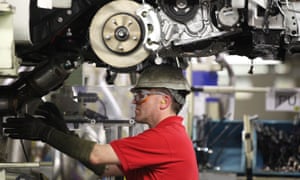Japanese carmaker’s decision safeguards the jobs of 3,000 workers as Brexit fears continue

A worker assembles a vehicle on the production line at Toyota’s factory in Burnaston, Derbyshire.
Photograph: Bloomberg/Getty Images
Toyota has announced it will build the next generation of its Auris car at its Burnaston plant in Derbyshire.
The Japanese carmaker said the majority of engines for the new cars would be manufactured at its Deeside factory in north Wales.
Toyota’s decision safeguards the jobs of about 3,000 workers across the two plants and is part of a £240m investment in the UK business announced by the company last year. The company has other European manufacturing plants in countries including Poland and France.
Johan van Zyl, the president and chief executive of Toyota Motor Europe, said the decision to make the third-generation Auris in Burnaston demonstrated the firm’s “confidence in the skills and capabilities” of its UK workers.
The UK car industry has said it needs urgent clarity on a transitional Brexit deal if it is not to risk Britain losing out to other European countries on investment as global automotive firms make key spending decisions.
Commenting on Toyota’s position, Van Zyl said: “As a company, we are doing what we can to secure the competitiveness of our UK operations as a leading manufacturing centre for our European business.
“With around 85% of our UK vehicle production exported to European markets, continued free and frictionless trade between the UK and Europe will be vital for future success.”
The new Auris will be unveiled at the Geneva Motor Show on 6 March and will start rolling off the production line at Burnaston by the end of 2018.
Last year, UK car production fell for the first time since the depths of financial crisis in 2009, as Brexit fears took hold and consumers turned their backs on diesel vehicles.
A total of 1.67m cars were made at UK factories in 2017, down 3% compared with 2016 as demand for British-made cars dropped both at home and abroad. The industry trade body, the Society of Motor Manufacturers and Traders, warned that 2018 was likely to be another tough year.
The SMMT abandoned a target to build more than 2m cars a year by 2020 – breaking a previous record of 1.92m in 1972 – because of the scale of uncertainty posed by Brexit.